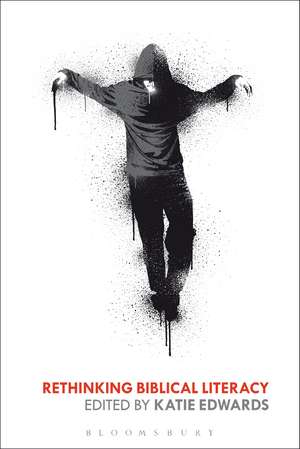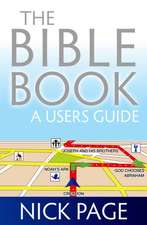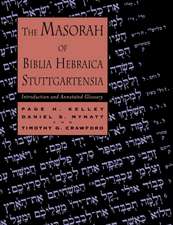Rethinking Biblical Literacy
Editat de Dr Katie B. Edwardsen Limba Engleză Paperback – 25 feb 2015
| Toate formatele și edițiile | Preț | Express |
|---|---|---|
| Paperback (1) | 238.67 lei 3-5 săpt. | |
| Bloomsbury Publishing – 25 feb 2015 | 238.67 lei 3-5 săpt. | |
| Hardback (1) | 773.45 lei 6-8 săpt. | |
| Bloomsbury Publishing – 25 feb 2015 | 773.45 lei 6-8 săpt. |
Preț: 238.67 lei
Preț vechi: 273.88 lei
-13% Nou
Puncte Express: 358
Preț estimativ în valută:
45.67€ • 47.69$ • 37.71£
45.67€ • 47.69$ • 37.71£
Carte disponibilă
Livrare economică 25 martie-08 aprilie
Preluare comenzi: 021 569.72.76
Specificații
ISBN-13: 9780567050984
ISBN-10: 056705098X
Pagini: 232
Ilustrații: 8 colour illus
Dimensiuni: 156 x 234 x 18 mm
Greutate: 0.41 kg
Editura: Bloomsbury Publishing
Colecția T&T Clark
Locul publicării:London, United Kingdom
ISBN-10: 056705098X
Pagini: 232
Ilustrații: 8 colour illus
Dimensiuni: 156 x 234 x 18 mm
Greutate: 0.41 kg
Editura: Bloomsbury Publishing
Colecția T&T Clark
Locul publicării:London, United Kingdom
Caracteristici
Fills gap in market for discussion of proliferation of biblical stories/characters in popular culture.
Notă biografică
Katie Edwards is Lecturer in Biblical Studies at the University of Sheffield, UK
Cuprins
Contents Introduction Part 1: LOCATED LITERACIES Ch. 1: Biblical Literacy: The Irish SituationMáire Byrne, Milltown Institute of Theology and Philosophy, IrelandCh. 2: What the Bible Really Means: Biblical Literacy in English Political DiscourseJames Crossley, University of Sheffield, UKCh. 3: The Quest for Biblical Literacy: Curricula, Culture and Case StudiesIona Hine, University of Sheffield, UKPart II: VISUAL LITERACIESCh. 4: Loss of the Bible and the Bible in Lost: Biblical Literacy and Mainstream TelevisionMatthew Collins, University of Chester, UKCh. 5: Streetwise About the Bible: Unexpected Allusions (to the Text) in Unusual PlacesAmanda Dillon, Mater Dei Institute of Education, IrelandCh. 6: Mary, Mary, Quite Contrary: Eve as Redemptrix in Madonna's Girl Gone WildAlan Hooker, University of Exeter, UKCh. 7: Biblical Literacy and The SimpsonsRobert Myles, University of Auckland, New Zealand Part III: POPULAR LITERACIESCh. 8: Lisbeth and Leviticus: Biblical Literacy and The Girl with the Dragon TattooCaroline Blyth, University of Auckland, New ZealandCh. 9: A Room Full of Poo: Eddie Izzard's Bible and the Literacy of LaughterChristopher Meredith, University of Winchester, UKIndex
Recenzii
Mentioned.
This is a fascinating collection, well-researched and reader-friendly. At the same time, the essays reveal a troubling fact: namely, that culture seems to make a greater impression on religious matters than biblical values do on culture. The book will be of interest to a broad audience.
The various contributors of this edited volume critically examine a variety of ways in which the Bible functions within culture ... On the evidence of this volume alone, it seems that the Bible is alive and well as a cultural commodity. Whilst people may no longer read the Bible in the way they once did ... they read it through film and television, through comedy and music, through politics and education. If biblical studies is ... the discipline of the study of the way people read the Bible, there may well be life in the old dog yet.
The book always remains stimulating and entertaining while rigorously engaging with the subject matter.
Rethinking Biblical Literacy is eminently readable and informative, and will be of interest to anyone who is concerned with the cultural appropriation of the Bible.
The range of case studies presented is fascinating ... [All] who value the Bible should pay heed to the evidence this book provides that knowledge and use of the Bible remains alive in (perhaps) the most surprising places.
The contributions in this volume bring the Bible out from dust-covered shelves and dwindling bible-study groups and examine it in contexts where it is alive and kicking: in school classrooms, political rhetoric, popular television shows and fiction, music videos and comedy routines. A breath of fresh air!
Anyone who has ever sighed about our "biblically illiterate" society needs to read this book. Katie Edwards has marshaled an exciting collection of voices to review the use of Bible in contemporary culture and challenge facile (elitist?) assumptions about what we mean by "biblically literate." The collection persistently demonstrates that a society "ignorant" and "uninterested" in the Bible invokes it rather often in popular culture and media. This is essential reading for those who don't want to parrot tired laments over the death of biblical influence but, instead, to understand the way Bible actually appears in our modern context.
Rethinking Biblical Literacy is a very welcome contribution to the debate that problematizes the lamented/applauded decline of biblical literacy. Exposing hidden assumptions and complicated political interests, it points to the ambiguity of the concept and shows how users make it serve conservative, subversive or even conflicting agendas. The volume should be mandatory reading for reception critics, but it can be recommended to anybody interested in the role of biblical traditions in contemporary society.
What does it mean to be biblically literate? This thought-provoking and materially diverse collection suggests many answers to the question and succeeds in complicating the biblical literacy debate so far. Is biblical literacy on the wane or might it actually be rising due to the recycling of biblical themes in popular culture?
The picture created is one of a broad range and at times surprising depth of knowledge about what remains arguably the most influential collection of texts ever published.
This is a fascinating collection, well-researched and reader-friendly. At the same time, the essays reveal a troubling fact: namely, that culture seems to make a greater impression on religious matters than biblical values do on culture. The book will be of interest to a broad audience.
The various contributors of this edited volume critically examine a variety of ways in which the Bible functions within culture ... On the evidence of this volume alone, it seems that the Bible is alive and well as a cultural commodity. Whilst people may no longer read the Bible in the way they once did ... they read it through film and television, through comedy and music, through politics and education. If biblical studies is ... the discipline of the study of the way people read the Bible, there may well be life in the old dog yet.
The book always remains stimulating and entertaining while rigorously engaging with the subject matter.
Rethinking Biblical Literacy is eminently readable and informative, and will be of interest to anyone who is concerned with the cultural appropriation of the Bible.
The range of case studies presented is fascinating ... [All] who value the Bible should pay heed to the evidence this book provides that knowledge and use of the Bible remains alive in (perhaps) the most surprising places.
The contributions in this volume bring the Bible out from dust-covered shelves and dwindling bible-study groups and examine it in contexts where it is alive and kicking: in school classrooms, political rhetoric, popular television shows and fiction, music videos and comedy routines. A breath of fresh air!
Anyone who has ever sighed about our "biblically illiterate" society needs to read this book. Katie Edwards has marshaled an exciting collection of voices to review the use of Bible in contemporary culture and challenge facile (elitist?) assumptions about what we mean by "biblically literate." The collection persistently demonstrates that a society "ignorant" and "uninterested" in the Bible invokes it rather often in popular culture and media. This is essential reading for those who don't want to parrot tired laments over the death of biblical influence but, instead, to understand the way Bible actually appears in our modern context.
Rethinking Biblical Literacy is a very welcome contribution to the debate that problematizes the lamented/applauded decline of biblical literacy. Exposing hidden assumptions and complicated political interests, it points to the ambiguity of the concept and shows how users make it serve conservative, subversive or even conflicting agendas. The volume should be mandatory reading for reception critics, but it can be recommended to anybody interested in the role of biblical traditions in contemporary society.
What does it mean to be biblically literate? This thought-provoking and materially diverse collection suggests many answers to the question and succeeds in complicating the biblical literacy debate so far. Is biblical literacy on the wane or might it actually be rising due to the recycling of biblical themes in popular culture?
The picture created is one of a broad range and at times surprising depth of knowledge about what remains arguably the most influential collection of texts ever published.










